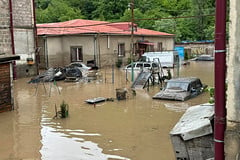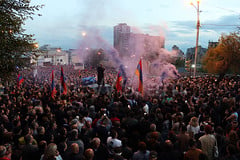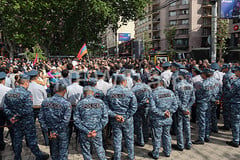
This time, the detentions of all eight military and political figures of Artsakh (Nagorno-Karabakh) illegally detained in the Azerbaijani capital of Baku were extended for five months. First, the detention of Artsakh ex-President Arkadi Ghukasyan, then of the other six figures, and today the detention of Artsakh former minister of state Ruben Vardanyan, was prolonged. Siranush Sahakyan, the Armenian prisoners’ representative at the European Court of Human Rights and president of the International Comparative Law Center, answered Armenian News-NEWS.am's questions.
Mrs. Sahakyan, this time, the detentions of Artsakh military and political figures illegally detained in Baku were extended not for four, but for five months. Was this to be expected? In your opinion, by what logic is this five-month period chosen?
Unfortunately, the extensions were predictable. It is clear that these fabricated criminal cases lack factual and legal bases, and this time is needed to falsify facts and convince the international community that the detention of these persons could supposedly have legal grounds.
Here, however, it is also worth noting that human rights standards require a reduction in the term of detention for persons in detention. In addition to these grounds, the standard of due diligence also applies here, which implies that the state must show that it has exercised due diligence in gathering evidence during the pretrial period, but there is still a need to extend detention for some objective reason. And if this due diligence is not justified, the restraining order is not subject to extension, or is subject to extension for a reduced period. But here, we see the opposite logic, which is a gross violation of the right to personal freedom and integrity.
The previous time, in January, when the terms of detention were extended for the second time by four months, they first announced the extension of the detention of Ruben Vardanyan, and then that of the other seven figures. This time, it was the opposite. They left Ruben Vardanyan for last. What do you think is their intention with this?
Yes, they are trying to isolate Ruben Vardanyan. In his case, we see that the Azerbaijani media regularly target him with messages along these lines. Unfortunately, the fact is that a person whose guilt has not been proven and cannot be proven continues to be illegally detained.
There is no clear indication of when the trial might begin. According to the legislation of Azerbaijan, it can start after six-nine months.
In addition, it is not even known whether the trial will be open. If Azerbaijan is so confident that it has arrested the "criminals" it is trumpeting about in its press and about whom it is preparing publications in English for foreign audiences, then the trial should be open to everyone. International human rights defenders and observers should have the opportunity to participate in it.
What are the mechanisms that should and can be implemented in this situation? There is the impression that both Armenia and international human rights organizations calmly observe how the terms of the persons held hostage are extended for months and simply record these facts without taking any effective measures.
By all possible means, whether legal or political, we should continue to advocate for the release of Armenians illegally held in Baku and demand an international response.
Recently, the United Nations Torture Committee made a direct reference to the so-called "anti-terrorist" classification Azerbaijan has used, considering it inadmissible and demanding the immediate release of the 23 Armenians. Steps in this direction should continue and be actively developed.
Politically, any peace agreement between Armenia and Azerbaijan must include the release of all Armenian prisoners.
















